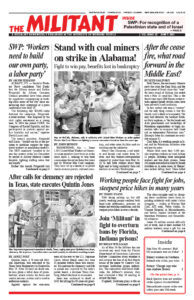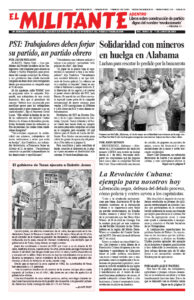Update:
The Militant was informed May 27 that the Florida Department of Corrections Literature Review Committee reversed the ban on all five issues. All the inmate subscribers will now be getting their papers.
As of May 26 the Militant has not received any word from the Florida Department of Corrections Literature Review Committee about whether it will reverse the ban of all five March issues of the paper by Century Correctional Institution prison authorities. The committee told David Goldstein, the Militant’s attorney, they had scheduled a May 20 meeting to review the bans.
If upheld, Goldstein plans to file an appeal demanding the impoundments be reversed.
“The banning of these issues by Century officials is a blatant attack on the Militant’s constitutional rights of freedom of speech and of the press,” said John Studer, the paper’s editor. “It deprived our readers behind bars access to their papers for over two months now.”
The rejection notices cited 11 articles that prison authorities claim “encourages riot, insurrection, rebellion, organized prison protest, disruption of the institution, or the violation of the federal law, state law or Department rules.”
But not a single article in the Militant has anything to do with this. The articles in the banned issues cover important developments in the labor movement: from the union-organizing drive at Amazon in Alabama to strikes by steelworkers against ATI and by bus drivers in Manchester, England, over pay and work hours. Labor struggles like these have been and will be the subject of numerous articles by newspapers worldwide.
One of the issues was impounded because authorities objected to an article headlined, “Protest: ‘Indict the Police Who Killed Breonna Taylor Now!’” This has been a topic frequently covered in the national press. Prison authorities also expressed objections to reports on the success that the Militant and Socialist Workers Party have had in winning contributions from readers from their government “stimulus” checks.
“At issue is the right of workers behind bars to read, think for themselves, and form their own opinions about what can be done about the economic and social crisis facing the working class today,” said Studer. “The Militant urges our growing number of prison subscribers to let us know if they are prevented from getting their paper.”
In Indiana, Kevin “Rashid” Johnson at the Wabash Valley Correctional Facility in Carlisle has also been deprived of a couple issues of the Militant that report on revolutionary advances made by working people in Cuba in the early 1960s. Authorities said they didn’t like a photo showing “images of guns.”
At issue is a well-known historical photo of Cuban militia members celebrating after the defeat of the U.S.-organized mercenary invasion at the Bay of Pigs in April 1961 that was aimed at overturning the socialist revolution.
This is not the first time prison authorities have banned Johnson, a leader of the New Afrikan Black Panther Party, from receiving the Militant. In 2019 and again last year the paper fought successfully to reverse impoundments of his paper by authorities at different jails.
Among those who have spoken out against previous efforts by prison officials to ban the Militant are Amnesty International USA, National Lawyers Guild, PEN America, Reporters Committee for Freedom of the Press, Florida Press Association, American Civil Liberties Union of Florida, union officials and many others.
Send letters urging these bans be reversed. In Florida, to Charles Huber, Literature Review Committee, Department of Corrections, 501 South Calhoun St., Tallahassee, FL 32399 or email Charles.Huber@fdc.myflorida.com. In Indiana, write to Chief Counsel Jon Ferguson, Indiana Department of Correction, 302 W. Washington St., Room E-334, Indianapolis, IN 46204 or email jFerguson1@idoc.IN.gov. Please send a copy to themilitant@mac.com.

